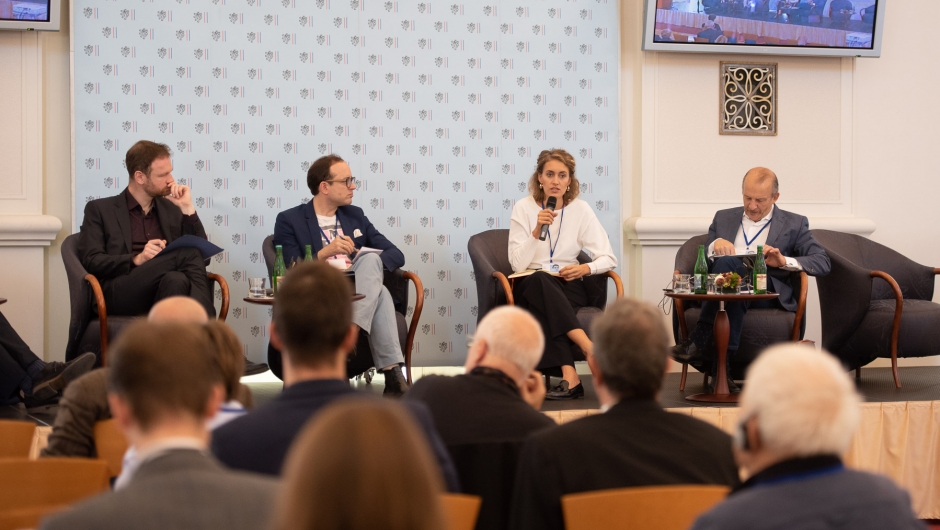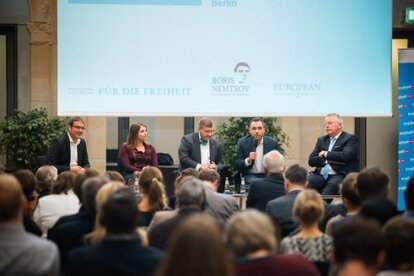Germany and Russia – The Boris Nemtsov Forum

Boris Nemtsov Forum 2018 in Prague. F.l.t.r.: Greg Yudin, Julius von Freytag-Loringhoven, Flavia Kleiner and Sergey Aleksashenko
©Boris Nemtsov, opposition politician and fighter for a free Russia, was shot and killed on 27 February 2015 in the heart of central Moscow – within sight of the Kremlin. The case continues to raise questions. Nemtsov's birthday, October 9, is not a festive occasion anymore, but has nevertheless become a notable anniversary for members of the Russian opposition over the last three years: since 2016, activists, human rights advocates and politicians meet once a year as the Boris Nemtsov Forum, a congregation that takes place on 9 and 10 October.
The Forum – organized by the Friedrich Naumann Foundation for Freedom and the Boris Nemtsov Foundation, and supported by the European Endowment for Democracy – serves as a platform for discussion and exchange of innovative ideas on the present and future state of the country and its society. In addition, the FNF supports the Boris Nemtsov Award, presented every June to an individual who has made an outstanding contribution to the fight for freedom of speech and for a free and open Russia. The Deputy Chairperson of the Foundation for Freedom, Sabine Leutheusser-Schnarrenberger, doubles as a member of the Board of the Boris Nemtsov Foundation, a fact that makes her a vital liaison to Russia's liberals in general.

Boris Nemtsov Forum 2017 in Berlin. f.l.t.r.. Christopher Gohl, Maria Snegovaya, Konstantin von Eggert, Konstantin Kuhle, Peter Limbourg.
‘My father was always forward-looking so the future is the topic of this forum’. With these words, Zhanna Nemtsova, Nemtsov's daughter, opened the 2017 Boris Nemtsov Forum in Berlin. The persistent discussion about Putin and his politics were important, Nemtsova stated, but did not actually help Russia in any substantial way. Under the title of ‘Politics without Vision?’, proponents of civil society with backgrounds in art, culture, science, and economics met to discuss their visions for a post-Putin Russia. In his introductory remarks, Gerhart Baum, the former Minister of the Interior, spoke out in favour of a relationship to Russia characterized by ‘a dialogue and openness’. Alisa Ganieva, a young writer, used her speech to vividly describe how difficult these visions would be to get across in Russia. Russian society has become deaf and mute. Large parts of the population are trying to rationalize and qualify the injustice and thus enable doubters already significantly influenced by Kremlin propaganda and disinformation.
In 2018, the Forum met in Prague, the capital of the Czech Republic, for the first time – this time under the title of ‘Russia: Strategies for the Society’. Guy Verhofstadt, Chair of the European Parliament's ALDE group, assumed responsibility for the difficult task of analysing the European Union's policy towards Russia. Verhofstadt favours a tougher stance in opposition to the Kremlin. He also emphasized, on the other hand, that ‘Russian civil society needs to be reassured that our strategy is not aimed at the Russian nation but exclusively at the Russian government’. Participants took up Verhofstadt's impetus. Following his speech, societal, economic, and political developments were discussed in a number of working groups.
Watch the keynote speech of Guy Verhofstadt at Boris Nemtsov Forum 2018.
Guy Verhofstadt, Boris Nemtsov Forum 2018
Watch the welcoming address of Dr Detmar Doering, Head of FNF Central Europe and the Baltic States.
Detmar Doering, Head of FNF Central Europe and the Baltic States